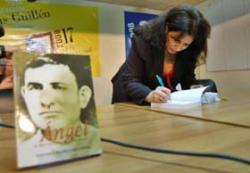Fidel Thanks Young Cuban Writer for Book on his Fathers Life
- Submitted by: admin
- Arts and Culture
- Caribbean
- Events
- Havana
- History
- International
- Literature
- Society
- 02 / 25 / 2008

Angel Castro, which was presented during the last day of the Havana segment of the Cuba 2008 International Book Fair.
'Angel, Fidel's Galician Root was presented on Sunday at the Nicolas Guillen Hall in the Cabaña Fortress in the Cuban capital and it is a valuable testimony that also constitutes an important tribute to the Galician migration to Cuba.
Rep. Fidel Castro also explains in his message that, on the occasion of the swearing-in session establishing the new legislature of the Cuban Parliament on Sunday, in accordance with the current Electoral Law and due to his health condition, he cast his vote by sealed enveloped sent to Parliament with the ballot papers.
In his message, he notes that he did not vote against any of the candidates and stresses that "our defense seems hermetic in front of the plans of the empire."
The leader of the Cuban Revolution also praises Katiuska Blanco for the virtues she also showed when she wrote 'All the Time of the Cedars, a book on Fidels childhood in Biran, in the eastern province of Holguin.
Fidel quotes excerpts of a letter he received last week from the young writer after he announced his decision not to aspire or accept another term in office as head of the Cuban Council of State, in which she praises his strategic vision and calls him "Commander in Chief of Ideas".
During the presentation of 'Angel, Fidel's Galician Root, Havana Historian Eusebio Leal and Miguel Barnet, President of the organizing committee of the 7th Congress of the Union of Cuban Artists and Writers (UNEAC), praised the prose and poetics present in the book.
"It is a long journey that began last year when I traveled to Lancara, a Galician region where Angel Castro was born and lived for several years," Katiuska Blanco explained.
Angel Castro was born in 1875 and he traveled to Cuba as a Spanish soldier in 1895. He returned to Spain four years later and, finally, early in the 20th century, he emigrated for good to settle in Biran.
The presentation of the book was attended by Culture Minister Abel Prieto; Carlos Valenciaga, member of the Council of State and by relatives of Fidel and Raul Castro.
(acn)
'Angel, Fidel's Galician Root was presented on Sunday at the Nicolas Guillen Hall in the Cabaña Fortress in the Cuban capital and it is a valuable testimony that also constitutes an important tribute to the Galician migration to Cuba.
Rep. Fidel Castro also explains in his message that, on the occasion of the swearing-in session establishing the new legislature of the Cuban Parliament on Sunday, in accordance with the current Electoral Law and due to his health condition, he cast his vote by sealed enveloped sent to Parliament with the ballot papers.
In his message, he notes that he did not vote against any of the candidates and stresses that "our defense seems hermetic in front of the plans of the empire."
The leader of the Cuban Revolution also praises Katiuska Blanco for the virtues she also showed when she wrote 'All the Time of the Cedars, a book on Fidels childhood in Biran, in the eastern province of Holguin.
Fidel quotes excerpts of a letter he received last week from the young writer after he announced his decision not to aspire or accept another term in office as head of the Cuban Council of State, in which she praises his strategic vision and calls him "Commander in Chief of Ideas".
During the presentation of 'Angel, Fidel's Galician Root, Havana Historian Eusebio Leal and Miguel Barnet, President of the organizing committee of the 7th Congress of the Union of Cuban Artists and Writers (UNEAC), praised the prose and poetics present in the book.
"It is a long journey that began last year when I traveled to Lancara, a Galician region where Angel Castro was born and lived for several years," Katiuska Blanco explained.
Angel Castro was born in 1875 and he traveled to Cuba as a Spanish soldier in 1895. He returned to Spain four years later and, finally, early in the 20th century, he emigrated for good to settle in Biran.
The presentation of the book was attended by Culture Minister Abel Prieto; Carlos Valenciaga, member of the Council of State and by relatives of Fidel and Raul Castro.
(acn)
Comments